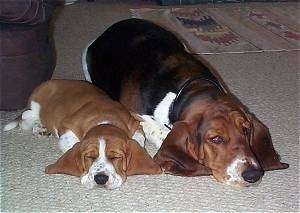
One thing we can all agree on, puppies are cute. All too often I get an email asking, "What kind of dog is this?" In most cases the photo sent in is an adorable picture of a very young puppy. When I email back and tell them what kind of dog it is along with a link to the information page, I hear back, "Oh, well are there any dogs that stay cute like that, even when the dog is full grown?" You guessed it; those adorable little puppies grow up to be adult dogs.
Puppies are cute, rambunctious and adorable. You can pick them up and cuddle with them. Raising puppies is similar to raising children in some respects. Puppies are babies and like human babies, they need a lot of sleep and will often fall asleep on your lap. Who can resist their adorable faces? But puppies can also be mischievous, defiant and destructive. They need leadership and guidance. They need to be secure in their new human pack and know the humans are capable of showing authority. If they do not feel/see this they will not be happy and secure and you just may be raising a dog who thinks he is alpha to humans. Instinct tells them there must be a strong leader and they crave and need discipline to feel secure. If you do not provide this structure your puppy will instinctually begin to try and provide it for YOU. Love and affection is enjoyed by the pup and important to the human, but it is not the number one thing this little canine animal that you bought into your human home needs. While your pup was still with his mother she gave the pup structure. She placed rules upon him, told him where he was and was not allowed to go and when he was allowed to go there. She told him when he was allowed to eat and how rough he was allowed to play. In return the puppy bonded with her and learned to follower her. The center of the pup’s life was around her and her authority. Once a puppy is separated from his canine mother, the humans must take over this role in order to raise the pup into a balanced and well-behaved dog. Getting a puppy is a lot of work and a long-time commitment. Puppies not only need leadership, but exercise, visits to the vet, housetraining, behavior training and socialization. Puppies go through a teething stage where they feel the irresistible urge to chew on everything in your house.
The cute, cuddly puppy stage does not last long. Their size, temperament, activity level and coat all change. Puppies grow up very quickly into adult dogs. In between the puppy and adult stages is a rebellious adolescent phase where puppies require almost constant supervision. Depending on the breed, by the time puppies are one year old, they are considered adult dogs. Some breeds of dogs take longer to mature out of their adolescent phase than others.
Less than one year will be spent in cute, cuddly puppy stage, while the next ten to 15 years you will be living with the adult dog. Puppies are cute, but by no means should one choose their dog solely on the looks of the pup. If you do not choose the right type of dog and provide leadership and daily exercise, your adult dog could grow up to be a holy terror.
Are you the passive type? Can you be calm, but stern even with the adorable teddy bear face of a puppy? What size dog do you want? Do you have children? Do you have a fenced-in yard? How much time will you have to train and walk the dog? Canine animals have an instinct to migrate, following their leader, and need to be taken for daily walks every day. These are all factors which you must consider before you decide on what type of dog you wish to own. Adopting a pup should not be taken lightly. It should be a well thought out decision which involves the entire family.
If you do not provide the proper amount of leadership and exercise these are the types of things you have to look forward to: Caught in the Act!
Below are some examples of puppies vs. adult dogs.
While the full-grown versions of these dogs are cute, there is something even cuter in the faces of the puppies.
Phoebe the Tibetan Terrier as a young puppy and Phoebe all grown up.
Written by Sharon Rose© Dog Breed Info Center® All Rights Reserved